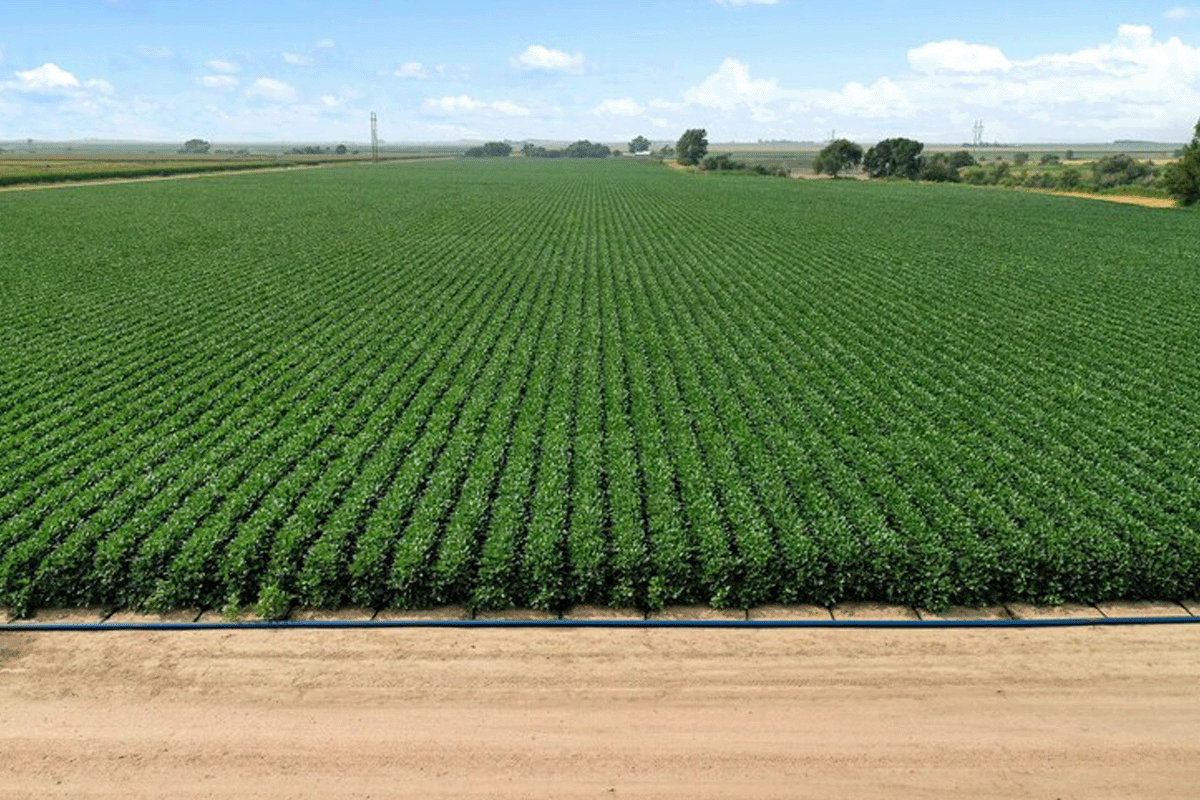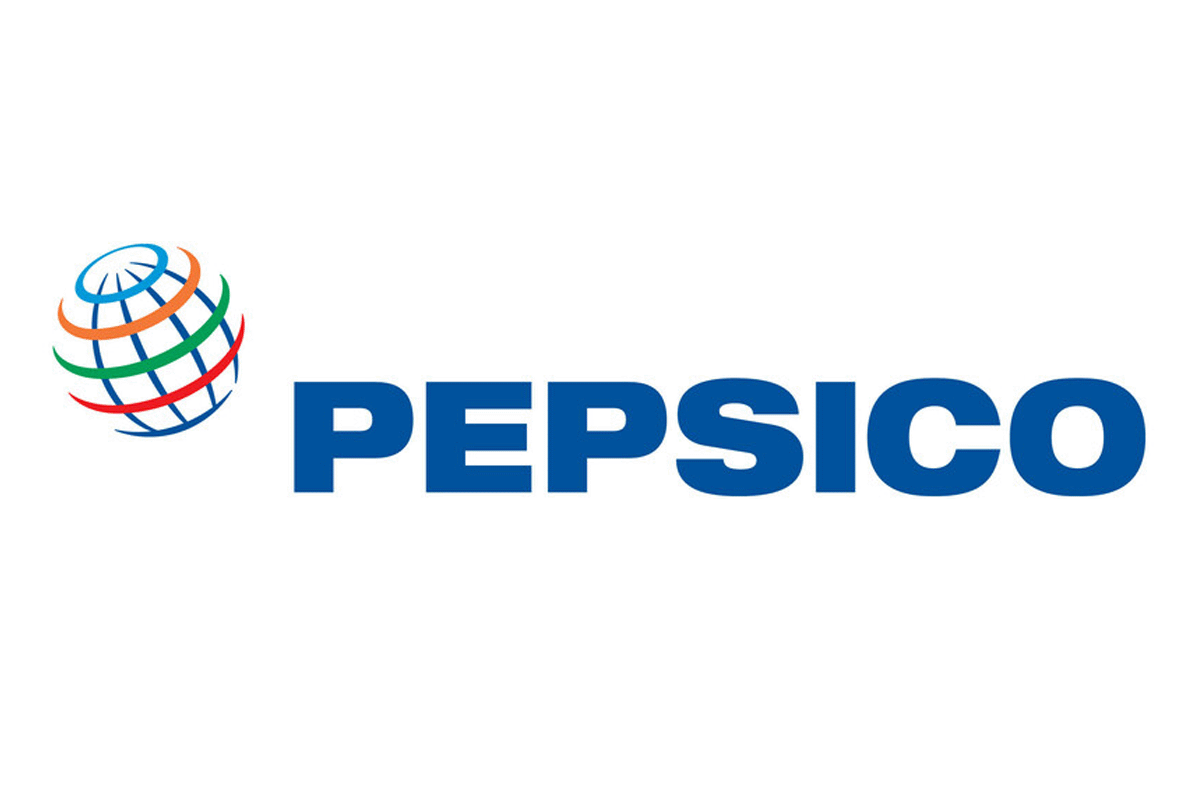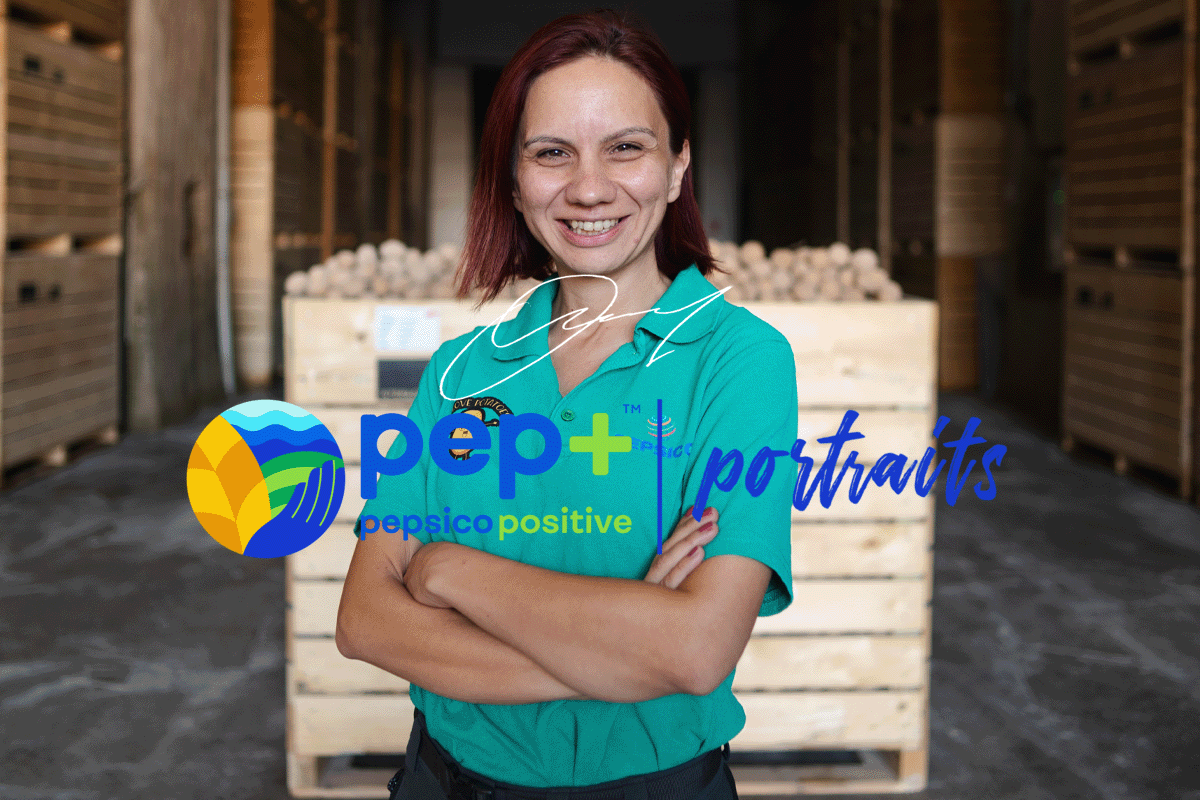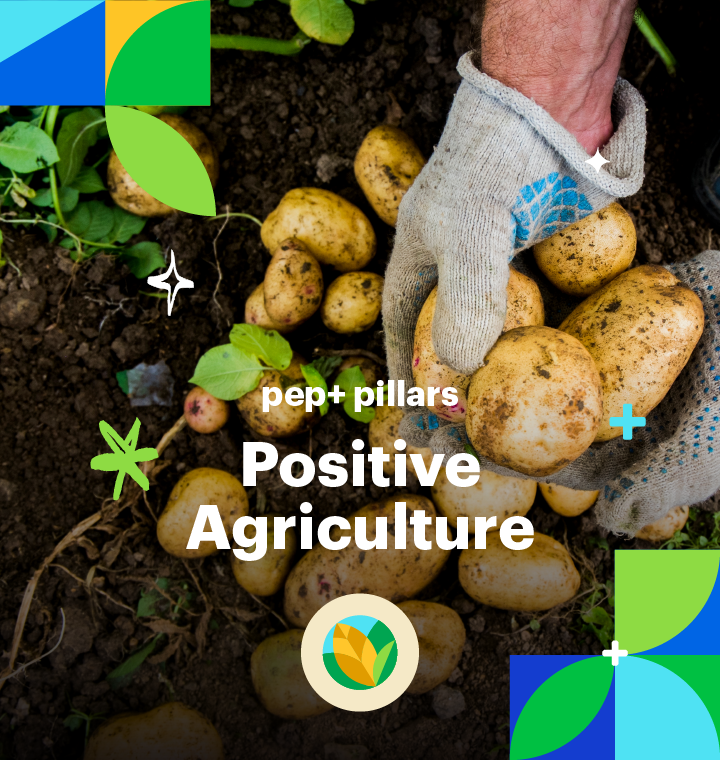
Our business depends on agriculture.
As a global convenient foods and drinks company, our business depends on agriculture — the first mile of our complex value chain. We rely on a secure source of crops and ingredients so we can make our products. Yet across the globe, farmers continue to acutely experience the impacts of climate change and face the realities of climate-related risks. These risks — from freshwater scarcity to soil degradation — are also risks to our business and the livelihoods of individuals and families across the agricultural supply chain.
Our Positive Agriculture agenda is designed to help address these risks, identify opportunities for action and collaboration and measure the impact of our efforts. This agenda includes our efforts to promote regenerative agricultural practices, increase our water-use efficiency in crop irrigation, and sustainably source our key ingredients from our suppliers.Together with like-minded partners, such as customers, suppliers and NGOs, we are trying to help transform global food systems. Ultimately, we aim to grow food in a way that revitalizes the earth, supports farmer livelihoods, feeds a growing population and innovates how ingredients are grown, all while seeking to positively impact farmers, communities and our planet.
Throughout 2023, we made progress across each of our Positive Agriculture goals in our supply chain, but remain focused on opportunities to expand upon our efforts.
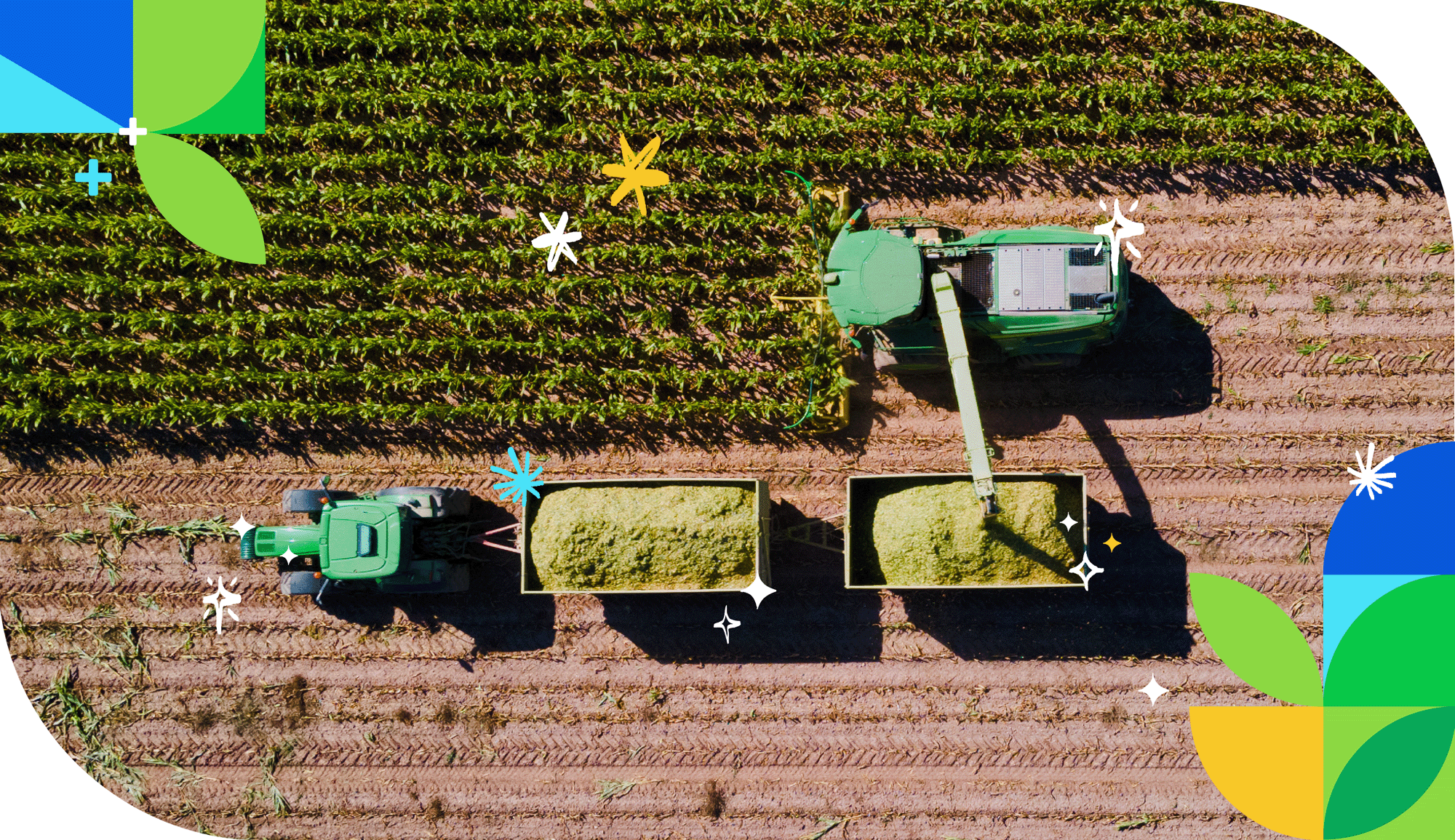
Our agricultural footprint
Tens of thousands of farmers from more than 60 countries provide more than 35 agricultural crops and ingredients. These farmers ensure our portfolio of products continues to be enjoyed more than one billion times a day in more than 200 countries and territories around the world.
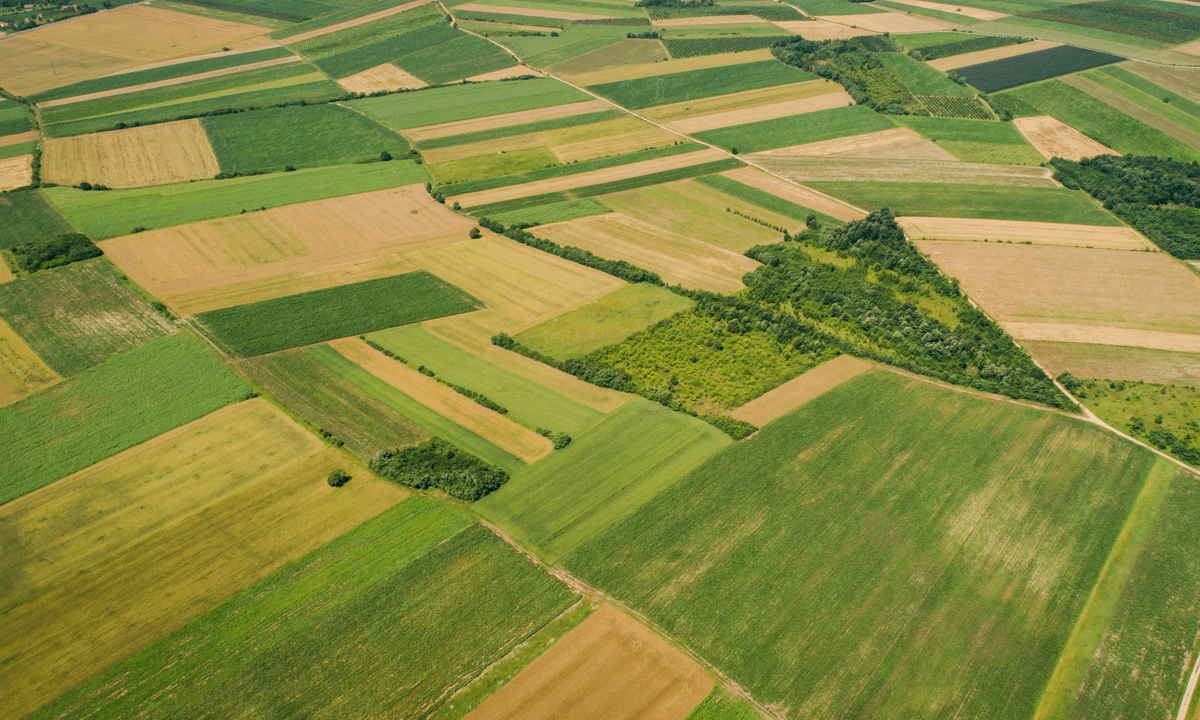
>7MM
acres of farmland in our
agricultural footprint
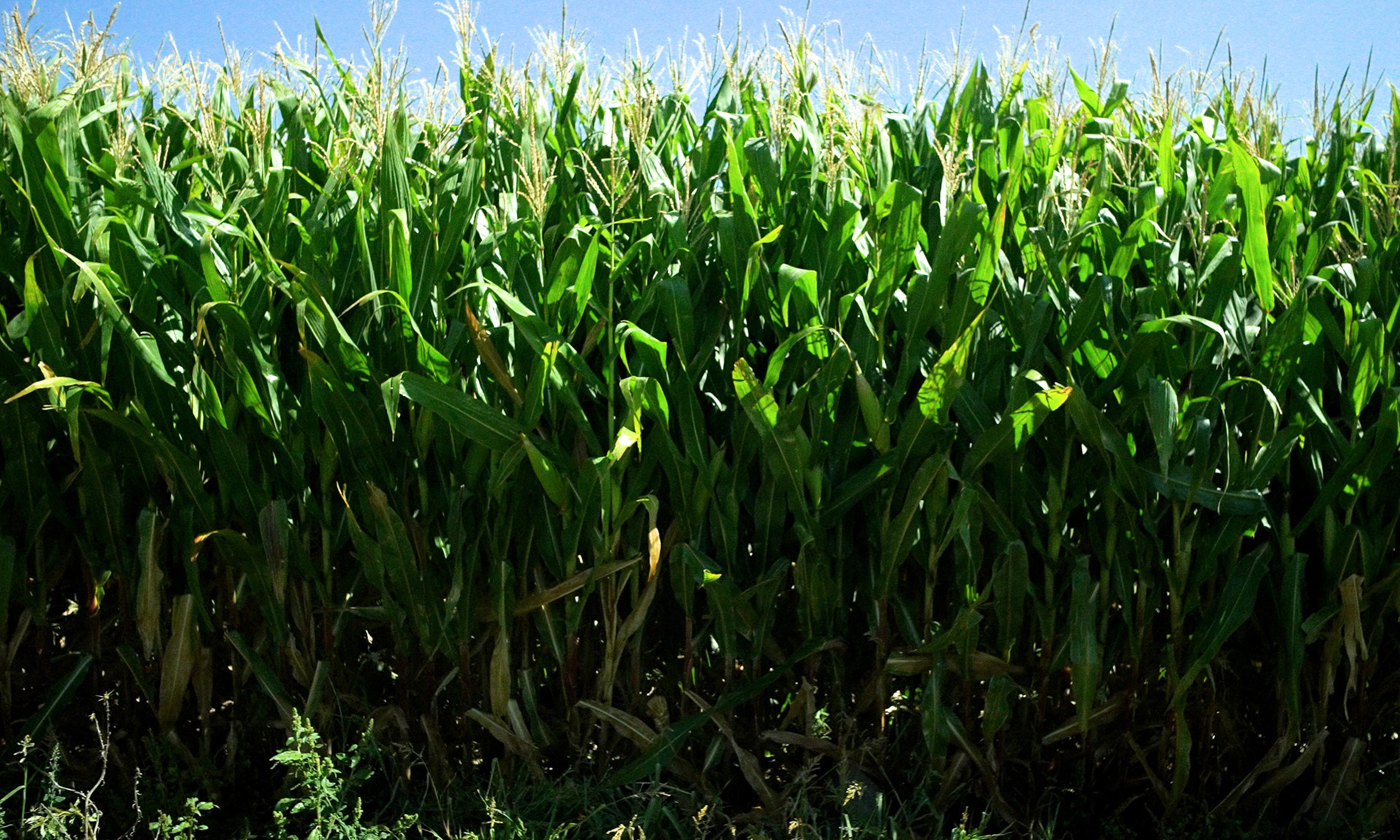
35+
agricultural crops and ingredients
go into making our products
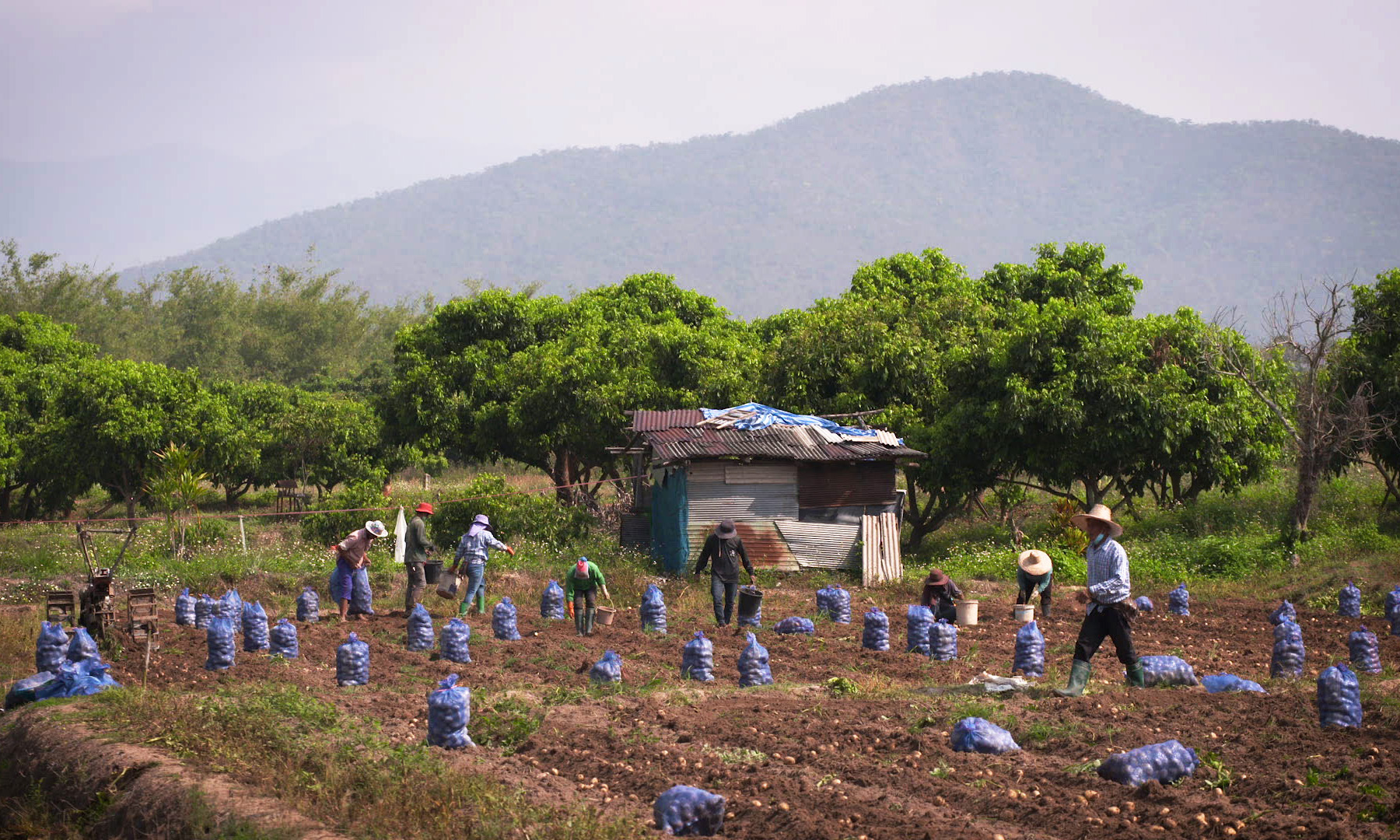
60+
countries supply agricultural crops and
ingredients for our many iconic brands
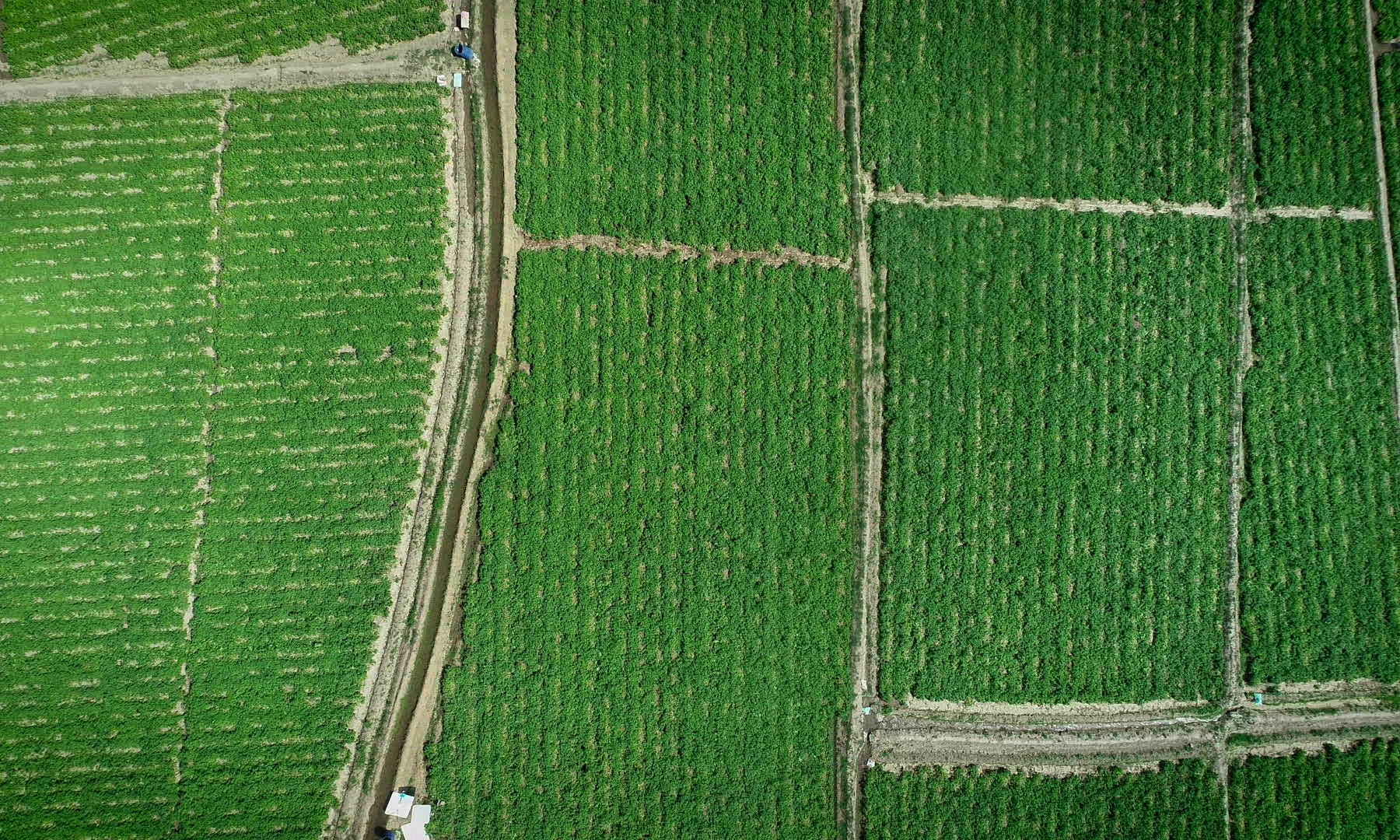
>1.8MM
acres farmed with
regenerative farming
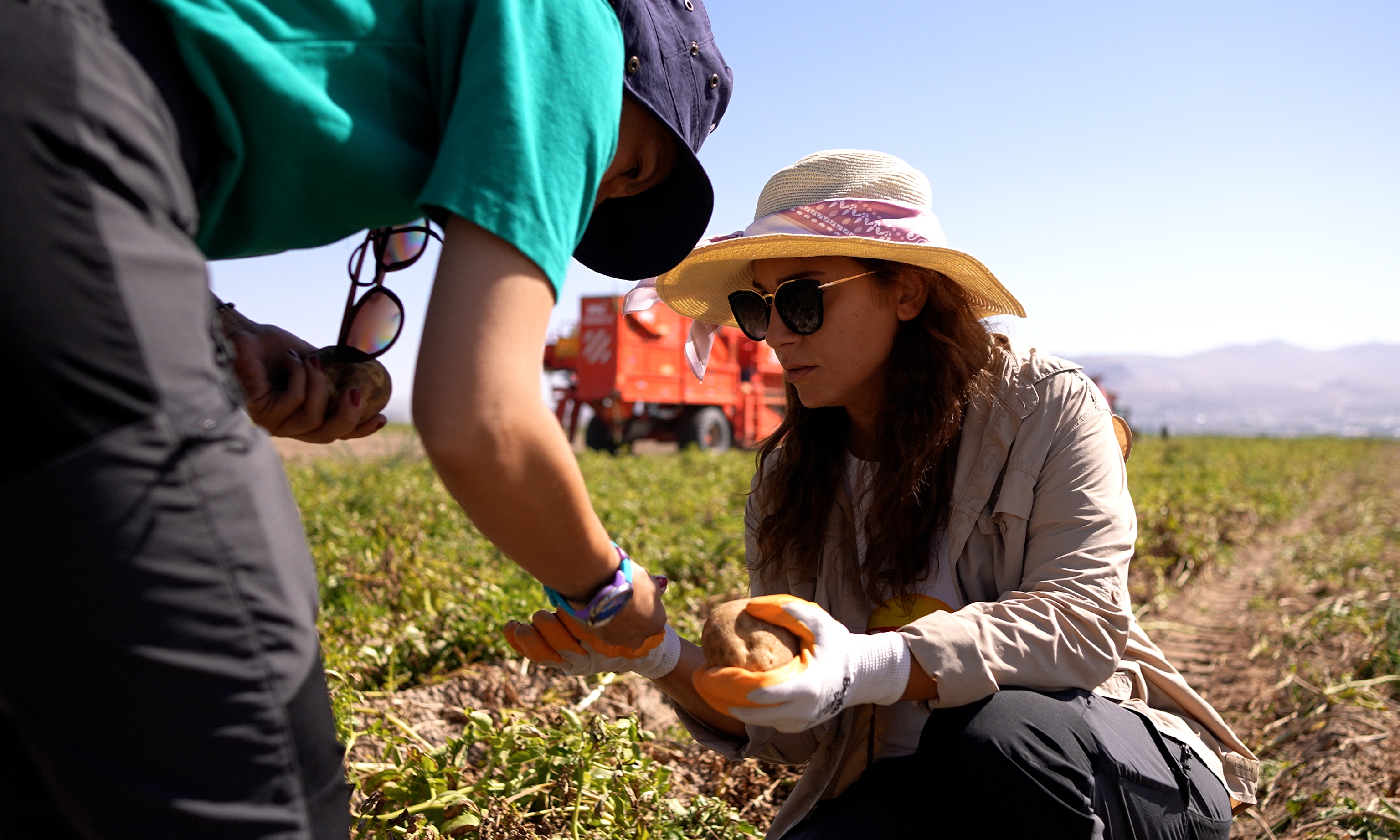
>90%
of our grower-sourced crops
are sustainably sourced globally1
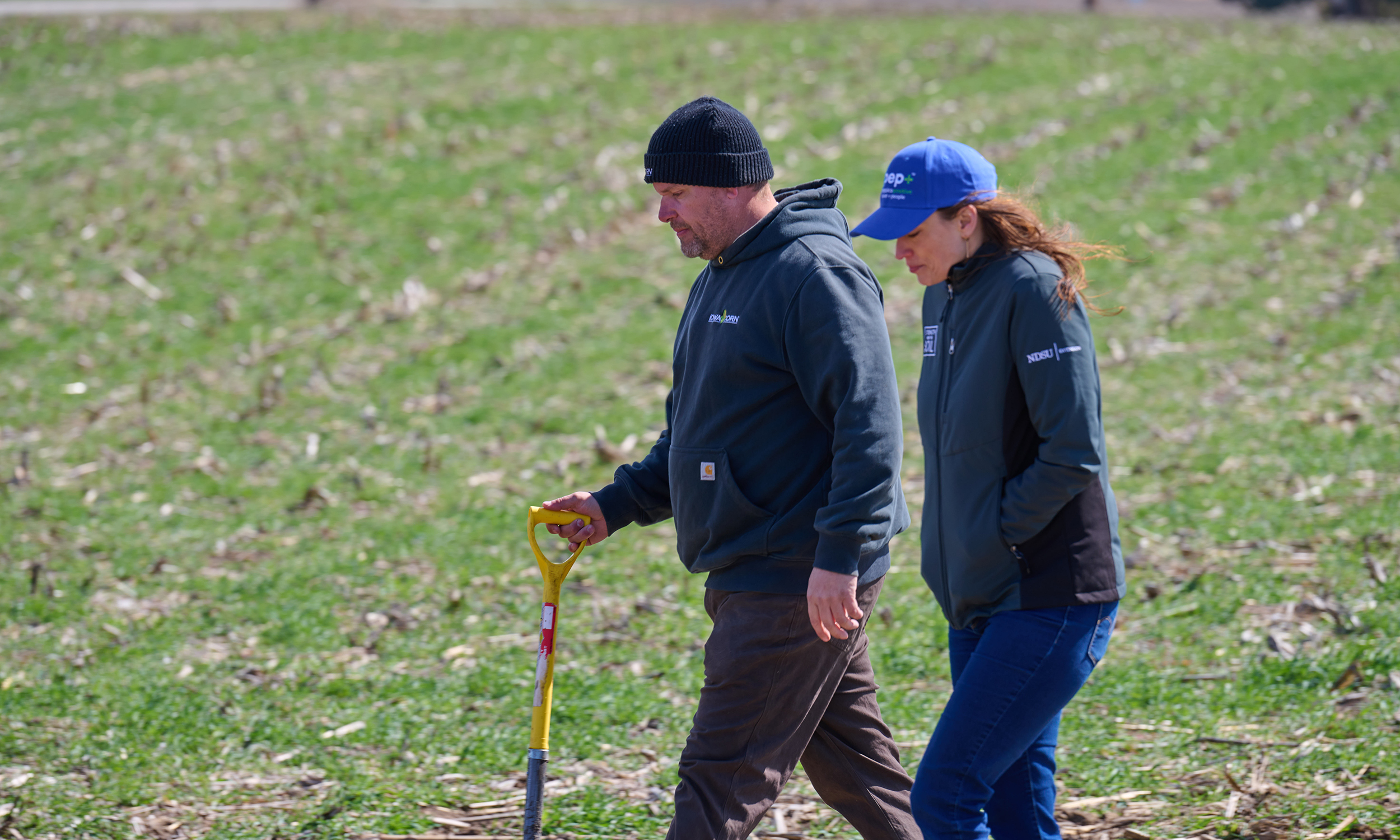
>57,000
farmers participated since 2021 in programs
focused on improving livelihoods2
1. For grower-sourced crops, sustainable sourcing refers to meeting the independently verified environmental, social and economic principles of PepsiCo’s Sustainable Farming Program (SFP). PepsiCo’s Sustainable Sourcing goal applies to areas where PepsiCo has purchasing control and excludes joint ventures, franchises, co-manufacturers and co-packers, and other third parties over which we do not hold purchasing control
2. Programs designed to improve livelihoods include those supporting economic prosperity, farmer and farm worker security and women’s economic empowerment
Approach, goals & progress
We want to support a positive future for farmers
The heart of our Positive Agriculture ambition is to support a positive future for farmers. Thriving communities and ecosystems are essential to achieve a secure supply of crops on which our business relies, so we aspire to help farmers grow food in a way that revitalizes the earth and supports their livelihoods.
Across our Positive Agriculture goals, we aim to scale and accelerate what has worked, continue to collaborate with stakeholders, adopt new technologies and establish partnerships that can have a substantive positive impact.
In 2023, we:
- Doubled our regenerative farming footprint year-over-year from more than 900,000 acres to more than 1.8 million acres globally;
- Exceeded our agricultural water-use efficiency target of 15% (reaching 22% when compared to a 2015 baseline) in high water-risk watersheds two years ahead of schedule by supporting farmers through partnerships, targeted training and programs such as our demonstration farms. We regularly review our pep+ goals and consider whether any changes are warranted. As a result of achieving this goal ahead of schedule, we will no longer report on it. But we will continue our work in watershed health through other pep+ goals and remain focused on continuous improvement;
- Sustainably sourced approximately 58% of our key ingredients1; and
- Reached more than 57,000 people since 2021 in our agricultural supply chain with programming that aims to support economic prosperity and women’s empowerment initiatives.
1. Key ingredients are defined in the Agriculture ESG Topics A-Z page. PepsiCo’s Sustainable Sourcing goal applies to areas where PepsiCo has purchasing control and excludes joint ventures, franchises, co-manufacturers and co-packers and other third parties over which we do not hold purchasing control
Approach to regenerative agriculture
Regenerative agriculture can be a powerful tool to confront climate change and mitigate risks for our business while also preserving natural resources for future generations. It can help with making soil healthier, capturing carbon, improving watershed health, protecting and enhancing biodiversity and raising the standard of living for farmers and farming communities.
Regenerative agriculture practices are implemented by farmers all over the world — from large-scale commercial farming systems to smallholder farms. In practice, each farm and its surrounding ecosystem is unique. Implementing regenerative agriculture practices requires us to balance newer regenerative practices with current, proven farming tactics adjusted to local ecosystems.We support a wide range of outcome-oriented regenerative practices, including planting cover crops to protect the soil, reducing tillage to maintain soil health and encouraging livestock integration and crop diversity. Depending on local conditions, regenerative techniques can help farmers grow more food on the same amount of land with optimized usage of water, fertilizer and pesticides.
Throughout 2023, we provided support to nearly 5,500 farmers as they adopted regenerative farming techniques. In total, this has helped improve the carbon footprint, biodiversity, soil health and watershed health on more than 1.8 million acres.
Successful regenerative agriculture starts with trust. We strive to earn the trust of the farmers within our supply chain by partnering with them and their trusted advisors, investing in their legacies and futures. Consistently, we hear there are three key components needed to transition to mutually beneficial regenerative agriculture practices:
- Economic support: Provide farmers with the economic support, such as cost-sharing, needed to transition to regenerative agriculture in a safer, more viable way, while also funding innovation and supporting start-up organizations with the potential to scale.
- Social and cultural support: Provide farmers with opportunities to connect with peers and community champions of regenerative agriculture through means such as holding field days for farmers to learn from other farmers in their community. For example, we showcase proven practices that work locally through demonstration farms. We currently have 83 demonstration farms around the world.
- Independent agronomic support: Help farmers scale regenerative agriculture, regardless of what stage of the process they’re in, by providing technical support to demonstrate how practices will work on their individual farm with its specific soil and weather conditions. An example includes our work with local implementers like Practical Farmers of Iowa (PFI), Soil and Water Outcomes Fund (SWOF) and the IL Corn Growers Association (ICGA).

1. Refer to PepsiCo’s Regenerative Agriculture Practice Bank for a comprehensive listing of practices directly or indirectly linked to the five impact areas
Working shoulder-to-shoulder with farmers and partners
We work with the farmers, farm workers, industry peers and agriculture partners in our supply chain to help transition to more sustainable agriculture practices that deliver farm-level impacts, such as greenhouse gas (GHG) emissions reductions.
Some examples of our stakeholder engagements that launched or expanded in 2023 include:- Initiating a large-scale, strategic collaboration with Walmart that aims to support regenerative practices on more than two million acres of farmland over seven years in the U.S. and Canada.
- Partnering with three well-respected farmer-facing organizations through a multi-year $216 million investment to support regenerative agriculture transformation on more than three million acres of U.S. farmland.
- Catalyzing public-private partnership funding in the U.S. through PepsiCo-supported grant submissions to the USDA’s Climate Smart Commodities Program. Our partners Field to Market and SWOF were awarded grants totaling up to $165 million for their projects.
- Pioneering a 7.5-year shared value commercial agreement with Archer Daniels Midland (ADM) that aims to reduce carbon intensity by expanding regenerative practices on up to two million acres across our shared supply chains. In 2023, the partnership expanded regenerative agriculture practices across more than 440,000 acres.
- Strengthening the climate resilience of potato farmers in the Chiang Mai and Chiang Rai provinces in Thailand by working with Deutsche Gesellschaft für Internationale Zusammenarbeit (GIZ) to help farmers adopt regenerative agricultural practices — equipping them with knowledge on climate resilience and adaptation essential for sustainable farming management.
- Creating demand for low-emission agricultural commodities by serving as a launch member of the World Economic Forum's First Movers Coalition for Food, which aims to create a combined procurement commitment for sustainably produced and low-emission agricultural commodities.
- Placing food systems on the global climate agenda at COP28 by joining forces with food and agriculture organizations for the Action Agenda on Regenerative Landscapes, which called for scaling the transition to regenerative agriculture by 2030. Over 20 leading players across the agriculture value chain, along with farmers, civil society, financiers and local government representatives will consolidate efforts to collectively scale-up implementation and land transition commitments.
- Partnering to create a global framework for regenerative agriculture by working with the Sustainable Agriculture Initiative (SAI) that has historically set the standard for sustainable sourcing. PepsiCo participated on the steering committee that helped craft the Regenerating Together Programme, a global framework for regenerative agriculture that aims to increase the simplicity of farmer adoption and increase consistency across regenerative agriculture implementation.

$216MM
to support regenerative agriculture
transformation on 3MM+ acres of farmland1
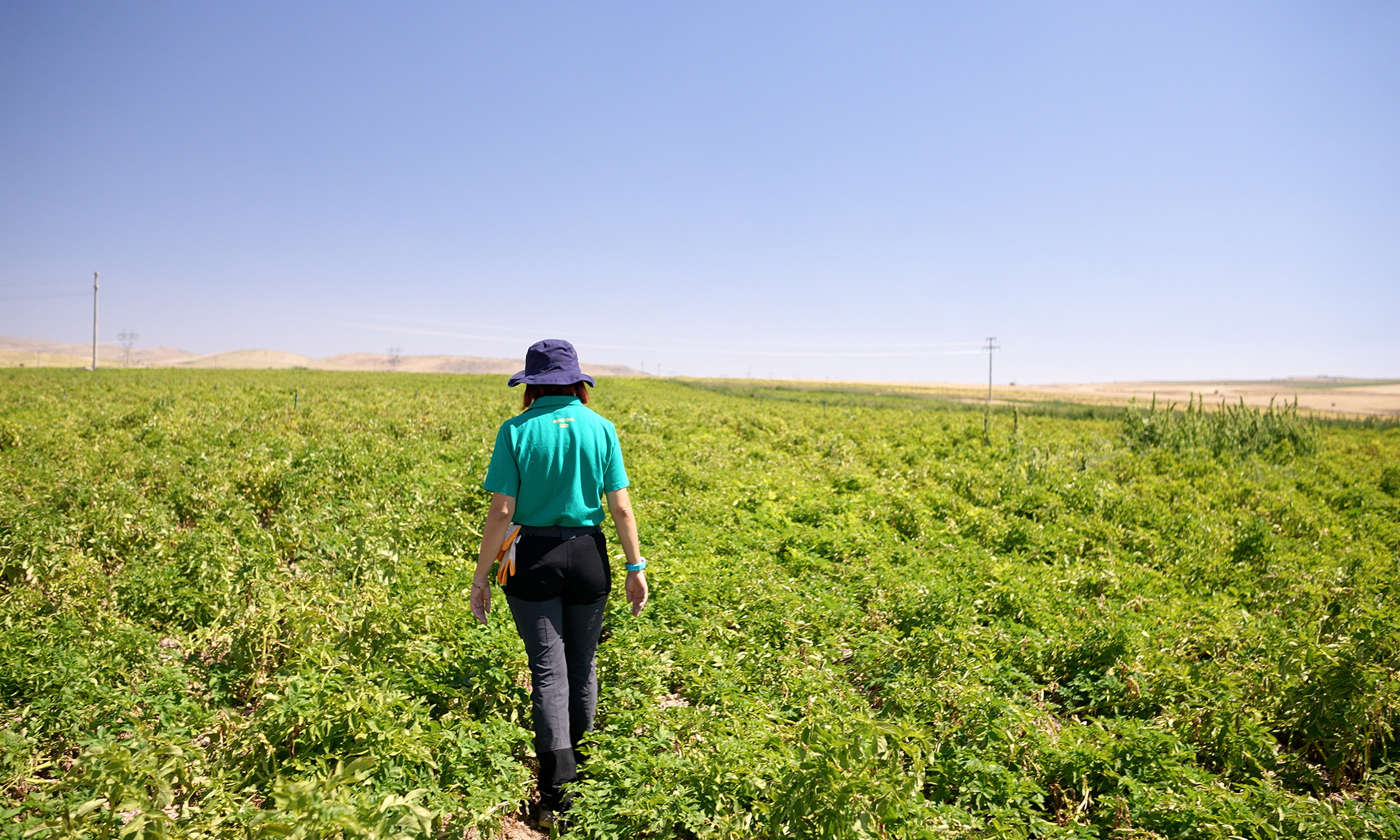
>1.4MM
metric tons of emissions expected to be
eliminated through our partnership with ADM
1. Through a multi-year investment with three farmer-facing organizations
Fueling innovative grassroots efforts
One way we cultivate innovation in agriculture is by supporting start-ups and grassroots organizations that we believe have the potential to scale. This, coupled with our continued partnerships with large, well-established organizations, helps us unlock business growth and access new ideas and technologies.
In 2023, we announced the continuation of the Positive Agriculture Outcomes Accelerator (the Accelerator) for a third year. The Accelerator incentivizes our local teams to design and scale innovative solutions by offering co-investment to projects that help progress toward our 2030 pep+ Positive Agriculture goals. By providing both financial and technical support, the Accelerator promotes long-term, transformative ideas impacting farming communities around the world.We plan to catalyze more than $30 million in investments through 2028 in over 30 different projects that span a range of sectors and supply chains. These investments support sustainable initiatives that test new solutions and help farmers "future-proof" their businesses and our supply chains. Examples from 2023 include:
- In Ecuador, we are transforming farm waste into valuable materials such as fertilizers and biogas. Focusing on potato farmers who also work with dairy cattle, the project seeks to promote sustainable practices like crop rotation and the conversion of farm waste into beneficial resources for the soil, crops and communities.
- In Canada, a regenerative agriculture program focusing on enhancing soil health aims to positively impact farm resilience, helping address adverse impacts of variable weather.
- In the U.K., a project is demonstrating how biodiversity has a direct relationship with resilient farming by introducing pollinator habitats and habitat restoration practices in the oat supply chain.
- In Türkiye, launching “Ortak Hareket, Yeniden Bereket” (“Common Movement, Abundance Again”) as part of the ongoing partnership between the PepsiCo Foundation, Anadolu Meralari and Lay’s, providing tailored trainings and funding to smallholder farmers across the region through our demonstration farm.
- In Mexico, a new effort, the Deep Soil Health project, combines digital technology, biological products and alternative irrigation methods to enhance soil quality and restore soil health.
Supporting nature positive outcomes
We’re focused on nature positive outcomes because our business is inextricably linked to the health of the land that grows the crops that ultimately end up in our products.
Promoting such outcomes has been a significant undertaking over the past two decades.1 We recognize the interplay between nature and business is complex, and our understanding continues to evolve. Across our supply chains, we are seeking to identify opportunities to mitigate environmental risks and support nature conservation and restoration.Examples of our recent efforts include:
- Launching the Climate Resilience Platform (CRP) together with the Alliance of Biodiversity International and CIAT. This online platform provides farmers, suppliers, NGOs and researchers with actionable insights about how climate change is impacting crops and geographies and how they can create resilience through regenerative agriculture. PepsiCo and CIAT are looking for partners to scale the CRP’s impact.
- Accelerating biodiversity on farms, with more than 1.6 million of our more than 1.8 million acres farmed with regenerative farming practices seeing measurable positive impact2 in biodiversity in 2023.
- Working across our value chain to support the transformation of our sourcing regions toward zero deforestation and supporting conservation, restoration and sustainable livelihoods with the Consumer Goods Forum’s Forest Positive Coalition and the Palm Oil Collaboration Group.
1. Since PepsiCo first launched its Performance with Purpose platform in 2006
2. Measured as per Field to Market's third-party biodiversity index
Regenerative agriculture goal
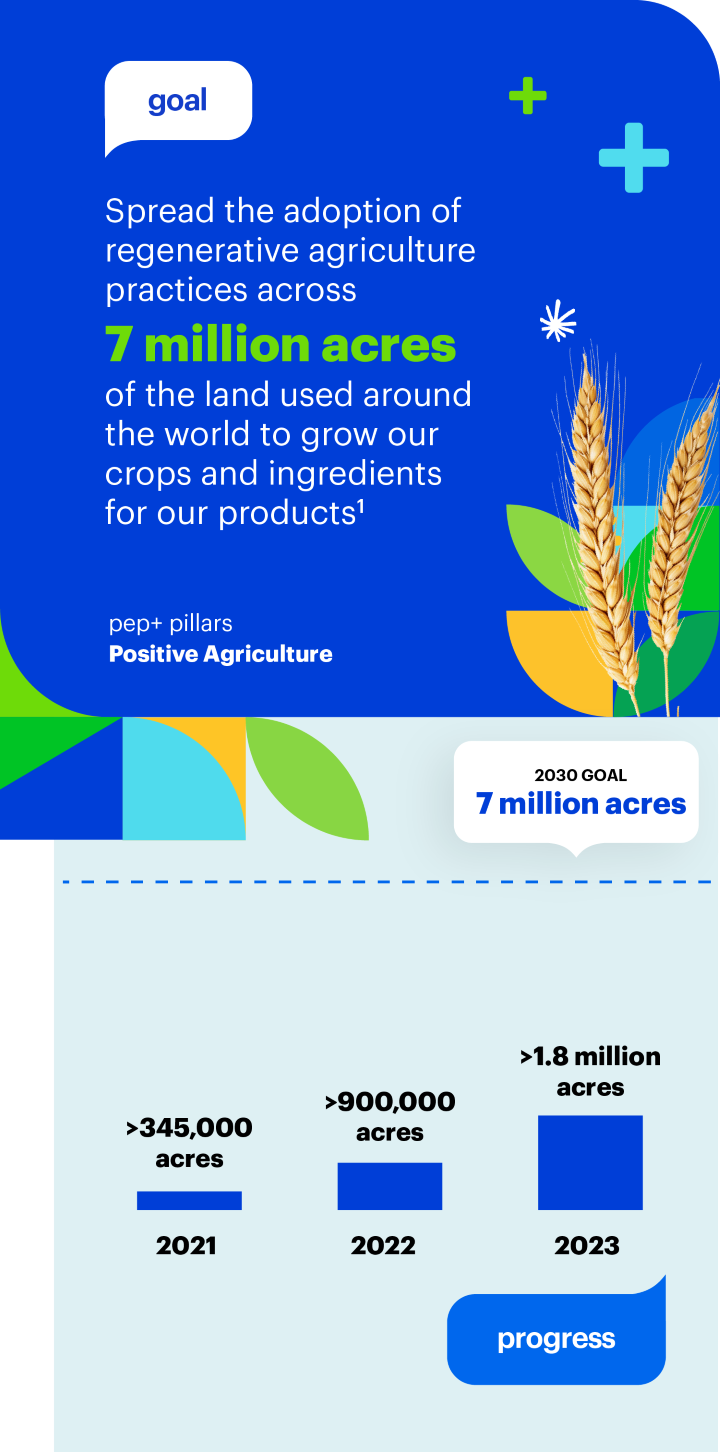
1. PepsiCo considers an acre as delivering regenerative impact when the adoption of regenerative agriculture practices results in quantified improvements across at least two of the environmental outcome areas, with a strong preference for removing or reducing GHG emissions to be one impact area. Refer to PepsiCo's Regenerative Agriculture Practice Bank for a comprehensive listing of practices directly or indirectly linked to the five impact areas. Regenerative acres reported represent the annual count in each year presented based on actions undertaken since 2021
Approach to agricultural water-use efficiency
Irrigation is an essential process for growing crops in many regions, so water is a critical resource for our business and the farmers we source from. This is what drives PepsiCo’s approach to agricultural water-use efficiency — measured as the volume of irrigation water required to grow one ton of raw crop material — and our healthy watershed improvement target of 15% by 20251 which was achieved two years early in 2023.
We continually seek more sustainable ways to use water when making our products and preserve it for the communities where we operate. In 2023, we sourced approximately 51% of our grower-sourced key ingredients from high water-risk areas,2 where our efforts to improve irrigation efficiency are especially focused.Another aspect of our approach is helping farmers transition to more water-efficient irrigation equipment, such as drip irrigation. Our partnership with N-Drip aims to help farmers in our supply chain adopt high efficiency irrigation technology across 25,000 acres by 2025. N-Drip’s gravity-powered technology combines the water-saving benefits of high-pressure drip irrigation with lower energy, operating and maintenance demands.
As we continue to improve water-use efficiency in areas where we directly source our crops, we identify the specific needs of high water-risk locations and create action plans that support farmers with the relevant training, equipment and resources they need to meet water goals. For example:
- In Thailand, we have supported growers moving to more efficient irrigation through various approaches, including the use of alternate furrow irrigation — an inexpensive and simple method of improving the efficiency of flood irrigation.
- In India, we have encouraged greater uptake of drip and sprinkler irrigation to improve water management in water stressed areas.
- In South Africa and Australia, we have adopted a methodology of “pivot audits” created in partnership with University of Pretoria in South Africa to maximize the efficiency of pivot irrigation systems.
1. Measured versus a 2015 baseline. This metric tracks the improvement of the water-use efficiency of PepsiCo’s direct agricultural supply chain. To focus efforts on implementing sustainable practices, we currently collect and publish agricultural water-use efficiency data at least once every three years. World Resource Institute’s Aqueduct water stress assessment tool is used to reconfirm high water-risk areas every three years. Results reflect assessments performed in 2023, 2020 and 2018
2. Based on sourced volumes from tier 1 suppliers of potatoes and corn from identified high water-risk regions in Australia, Argentina, Chile, China, the Dominican Republic, Egypt, Greece, India, Mexico, Pakistan, Peru, Saudi Arabia, South Africa, Türkiye and the United States
Agricultural water-use efficiency in areas of high water-risk goal
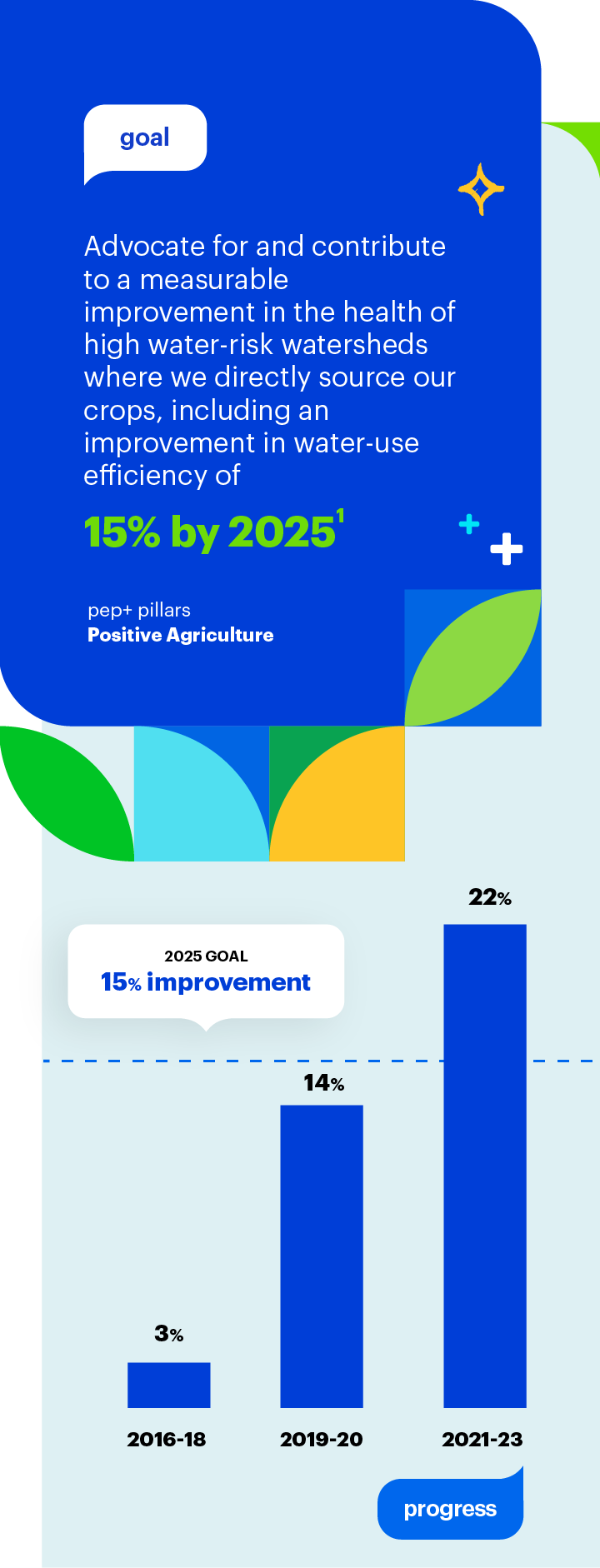
1. Measured versus a 2015 baseline. This metric tracks the improvement of the water-use efficiency of PepsiCo’s direct agricultural supply chain. To focus efforts on implementing sustainable practices, we currently collect and publish agricultural water-use efficiency data at least once every three years. World Resource Institute’s Aqueduct water stress assessment tool is used to reconfirm high water-risk areas every three years. Results reflect assessments performed in 2023, 2020 and 2018
Approach to sustainable sourcing
Without a consistent supply of agricultural crops and ingredients, we wouldn’t be able to make our products and meet the needs of our customers and consumers. Our sustainable sourcing approach aims to address social, economic and environmental pillars of how our products are produced while ensuring a steady supply of key ingredients for production.
To do so, we aim to leverage our global scale and purchasing power to raise the standards of environmental management and conservation of natural resources. Our agricultural suppliers are expected to adhere to our Supplier Code of Conduct and other relevant sustainable sourcing1 policies such as our Land Policy and Global Human Rights Policy.
Our Stewardship of Forests and Natural Ecosystems Policy outlines our aspiration for deforestation- and conversion-free business operations and supply chain. We are implementing this policy in our agricultural value chains where we face forest and natural ecosystem conversion risk. For example, in our palm oil supply chains we uphold a No Deforestation, No Peat and No Exploitation (NDPE) commitment as outlined in our Global Policy on Sustainable Palm Oil.
In 2023, 48% of our key ingredients (by volume) were “grower-sourced” — purchased directly from farmers through a grower group — while the remaining approximately 52% were “supplier-sourced” with multiple tiers between the farmer and PepsiCo. Key ingredients include, but are not limited to potatoes, corn, oats, milk, wheat, beet sugar, soy, cocoa, sunflower and canola. For a full list of key ingredients, see Calculation methodology.
We collaborate with certain suppliers, industry groups and NGOs using two approaches to achieve our sustainable sourcing goal:
- High-risk approach (verified volumes): Requires high-risk commodities (palm, cane and soy) and commodities grown in high-risk markets to be verified/certified to a sustainability standard recognized by PepsiCo.
- Low- and medium-risk approach (continuous improvement): Consists of either approved certifications or a demonstration of active work and progress toward outcomes that address the key risks for the farmers in the sourcing region by 2030.
For more than a decade, we have collaborated with farmers to adopt practices that build resilience and improve and restore ecosystems through our Sustainable Farming Program (SFP). Like our demonstration farms, this farm-level engagement also builds farmer confidence, addresses risks and encourages continuous improvement by providing farmers with safe spaces to grow accustomed to new processes and technologies. SFP focuses on self-assessment, capacity building and verification of farm-level sustainable agriculture practices and principles as described in the SFP Scheme Rules and SFP Fundamental Principles.
For example, our Agriba Sustentable program in Mexico aims to promote the adoption of regenerative agricultural practices among wheat producers in the Bajío region. In 2023, the program engaged nearly 300 farmers in the region covering more than 12,000 acres, resulting in a more than 30% reduction in GHG emissions and a more than 5% reduction in water use per kilogram of wheat produced when compared to controlled fields without regenerative practices.
Certain legal and systemic barriers will challenge us as we strive toward our goal of sustainably sourcing 100% of our key ingredients. For example, certain jurisdictions prohibit farmers from holding legal rights to the land they farm (a component of our sustainable sourcing definition). In areas with such systemic challenges, we strive to make substantive progress on the social, economic and environmental pillars of our sustainable sourcing goal.
1. PepsiCo’s approach to sustainable sourcing covers the production of ingredients in our direct supply chain where PepsiCo has purchasing control. It does not cover ingredients or products produced by joint ventures, franchises, co-manufacturers and co-packers and other third parties over which we do not hold purchasing control
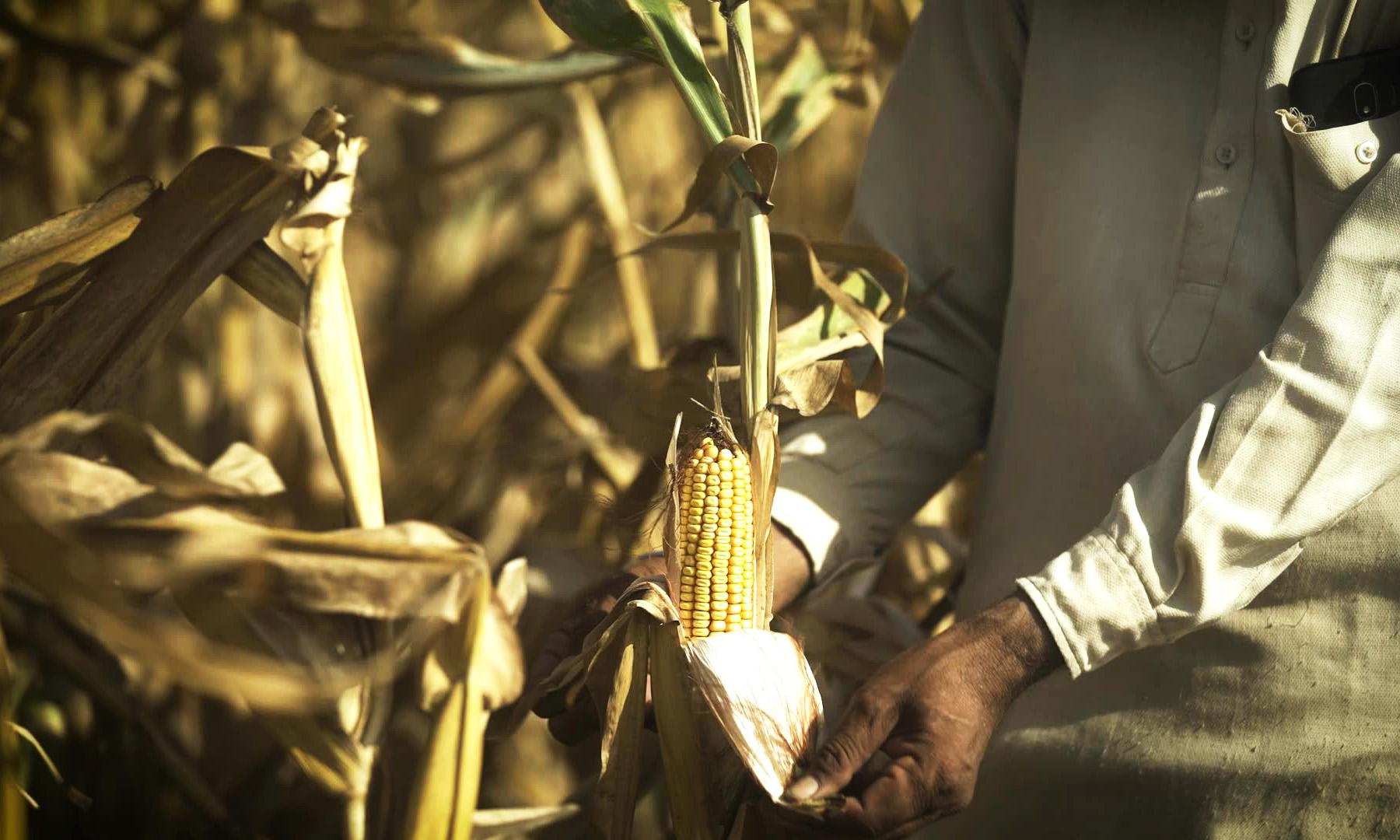
~58%
of our key ingredients were
sustainably sourced in 2023
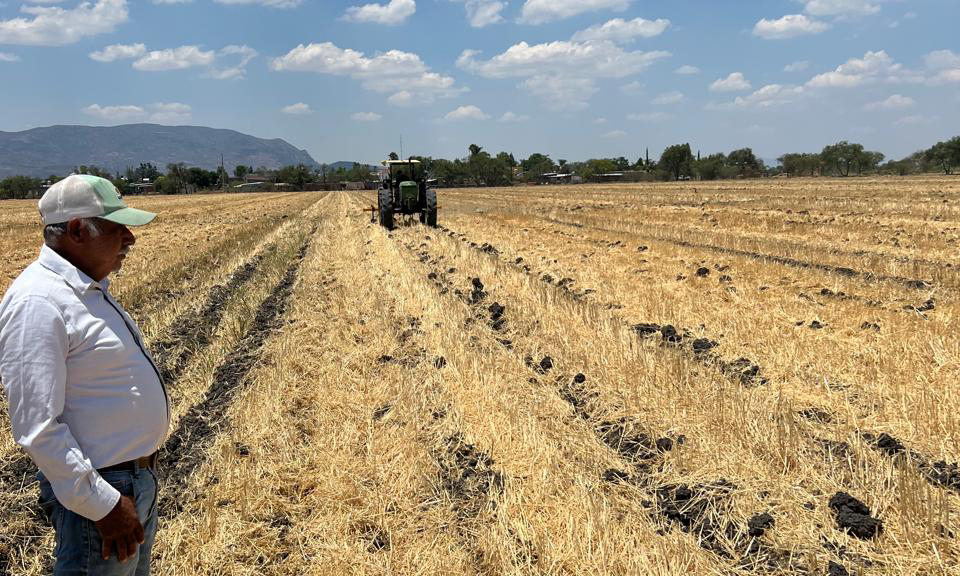
>30%
GHG emissions reduction from practices
employed in Bajío region in 2023
Sustainable sourcing goal
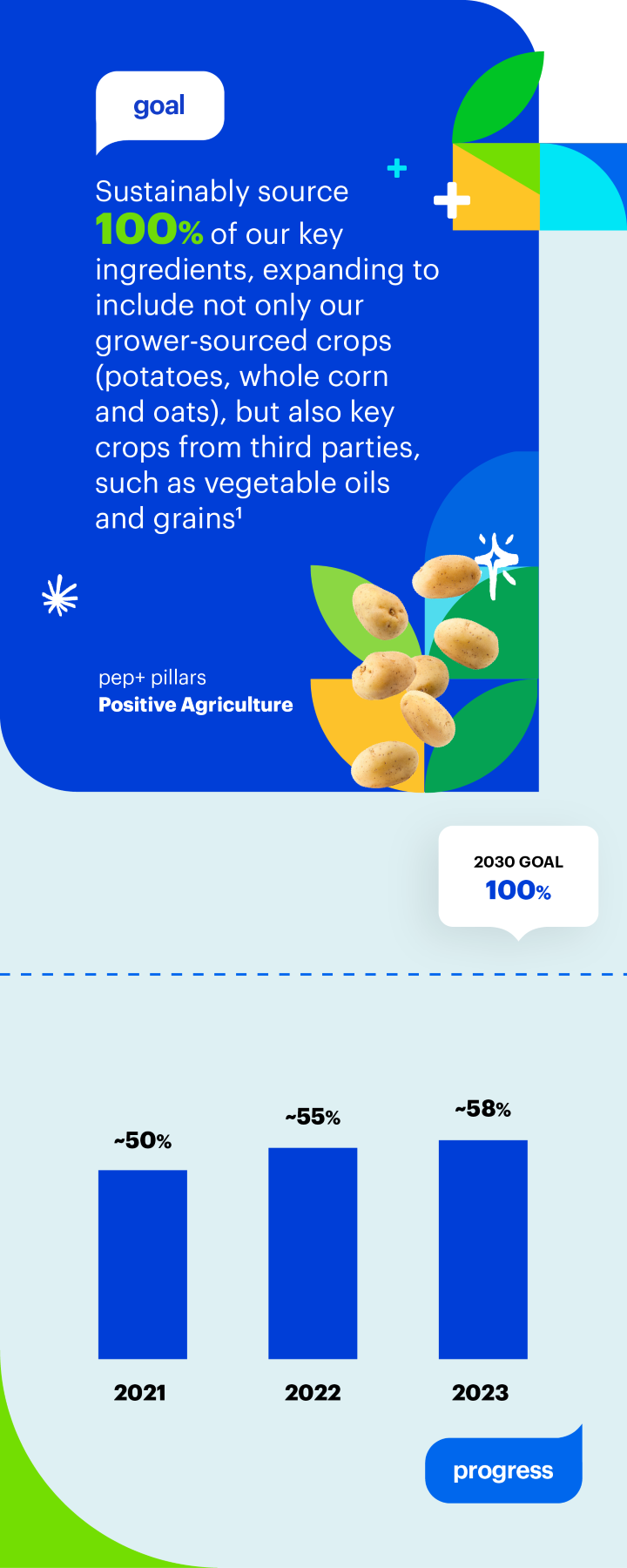
1. For grower-sourced crops, sustainable sourcing refers to meeting the independently verified environmental, social and economic principles of PepsiCo’s Sustainable Farming Program (SFP). For supplier-sourced crops, sustainable sourcing is achieved through a third-party standard that has been benchmarked as equivalent to the SFP or, in limited regions, a continuous improvement program addressing the main environmental and social risks with growing the relevant crop. Sustainably sourced volumes are verified by third parties, including Roundtable on Sustainable Palm Oil (RSPO) - certified palm oil and Bonsucro-certified (or equivalent) cane sugar. Certain legal and systemic barriers will challenge us as we strive toward our goal of sustainably sourcing 100% of our key ingredients. For example, certain jurisdictions prohibit farmers from holding legal rights to the land they farm (a component of our sustainable sourcing definition). Our Sustainable Sourcing goal applies to areas where PepsiCo has purchasing control and excludes joint ventures, franchises, co-manufacturers and co-packers and other third parties over which we do not hold purchasing control. Key ingredients are listed in the Agriculture ESG Topics A-Z page
Approach to improving livelihoods
When farmers thrive, we thrive. However, farmers and agricultural communities face many challenges that threaten both their livelihoods and our collective food systems — from extreme weather events to topsoil depletion and risks to human rights.
Among the most vulnerable are smallholder farmers, farm workers, temporary or migrant workers and women in rural agricultural communities. We recognize that we cannot solve the challenges facing these groups alone. We hope our efforts will help strengthen farming communities and farmer health and promote greater wellness and prosperity. Helping encourage more sustainable and inclusive food systems not only supports farmers, but is another way we work to secure the supply of ingredients our business depends upon.
Similar to other aspects of our Positive Agriculture agenda, we rely on strategic partnerships across certain geographies, sectors, industries and supply chains to leverage technical and financial resources that can help farmers transition to more inclusive and regenerative practices.
Importantly, our Livelihoods Implementation Framework for Engagement (LIFE) provides a roadmap for our programming with vulnerable communities in targeted sourcing regions and defined metrics to help us credibly measure the impact of our ongoing efforts, with a focus on trying to drive outcomes across three areas:
- Economic prosperity: Supporting long-term farm profitability and productivity with an emphasis on regenerative agriculture.
- Farmer and farm worker security: Addressing issues of food security, labor conditions and land rights and enabling access to resources.
- Women’s economic empowerment: Improving women’s access, agency and use of resources, decreasing legal and institutional barriers and reducing women’s time poverty.
LIFE advances a set of common indicators and metrics that reflect industry best practice and global norms and standards. These indicators are aligned with international norms including the United Nations’ (UN) Sustainable Development Goals (SDGs), International Labor Organization (ILO), UN Food and Agriculture Organization (FAO) and UN Guiding Principles on Business and Human Rights.
PepsiCo offers this framework as a resource for others seeking to positively impact livelihoods.
We also aim to economically empower women within our agricultural supply chain by equipping them with workforce readiness resources. To combat systemic inequality in farming and agriculture, PepsiCo and the PepsiCo Foundation engage in a number of initiatives, including:
- Continued strategic partnerships with Inter-American Development Bank (IDB), Cooperative for American Relief Everywhere (CARE), National Future Farmers of America Organization and the National Black Growers Council, to support diversity and inclusion in farm management.
- Agrovita is a three-year collaboration with the PepsiCo Foundation and non-profit Proforest which aims to empower women and other smallholder farmers in Southeast Mexico to grow crops in a more sustainable way. The program has garnered support from partners such as the Walmart Mexico Foundation, Technoserve and ECOM, and has reached nearly 35,000 people since launch. At the end of 2023, three plantain producers formalized the first rural cooperative company which allows them to sell plantains to PepsiCo Mexico Foods, used to produce Natuchips.
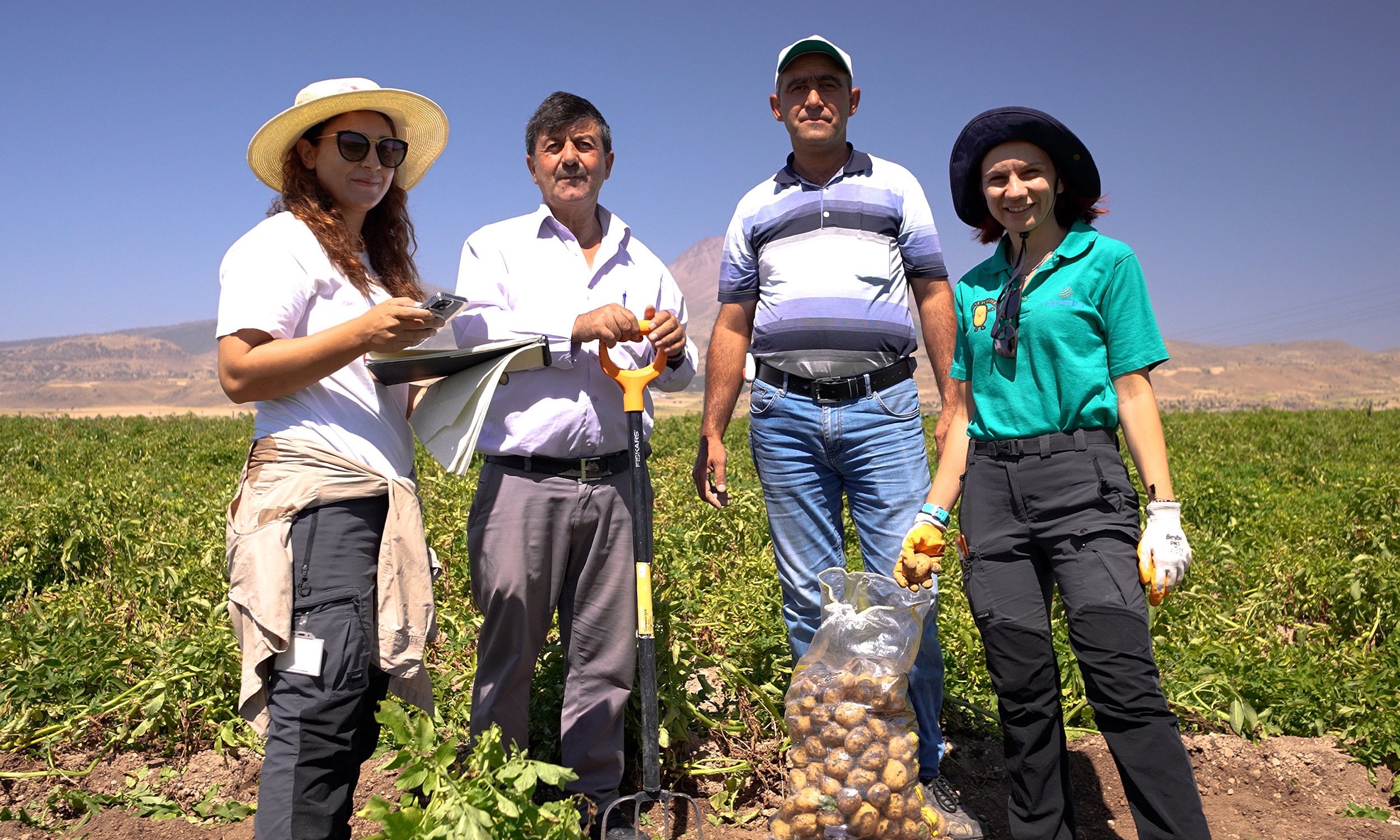
~300,000
people engaged in active livelihoods
initiatives across 14 countries
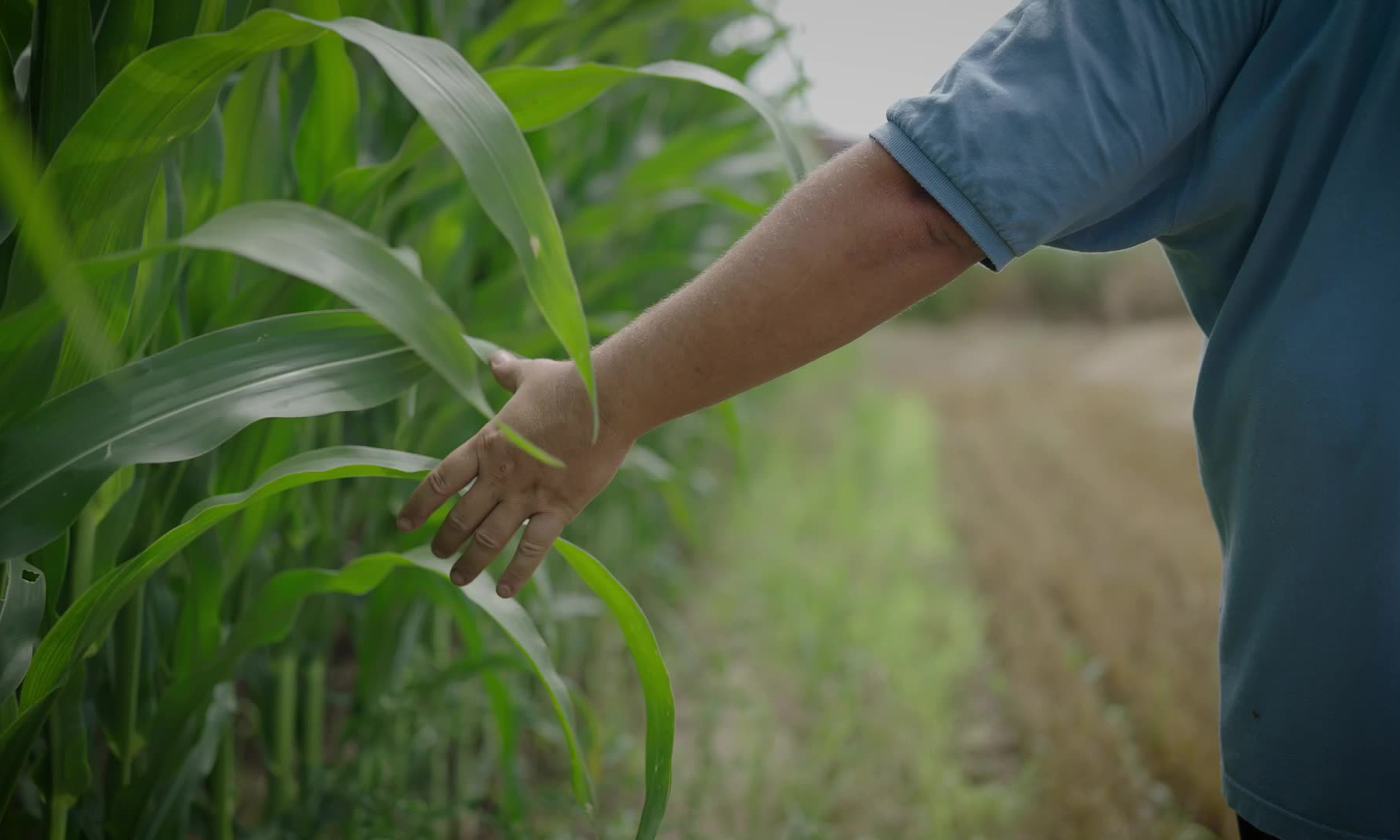
15+
partners supported livelihoods
initiatives in 2023
Improving livelihoods goal
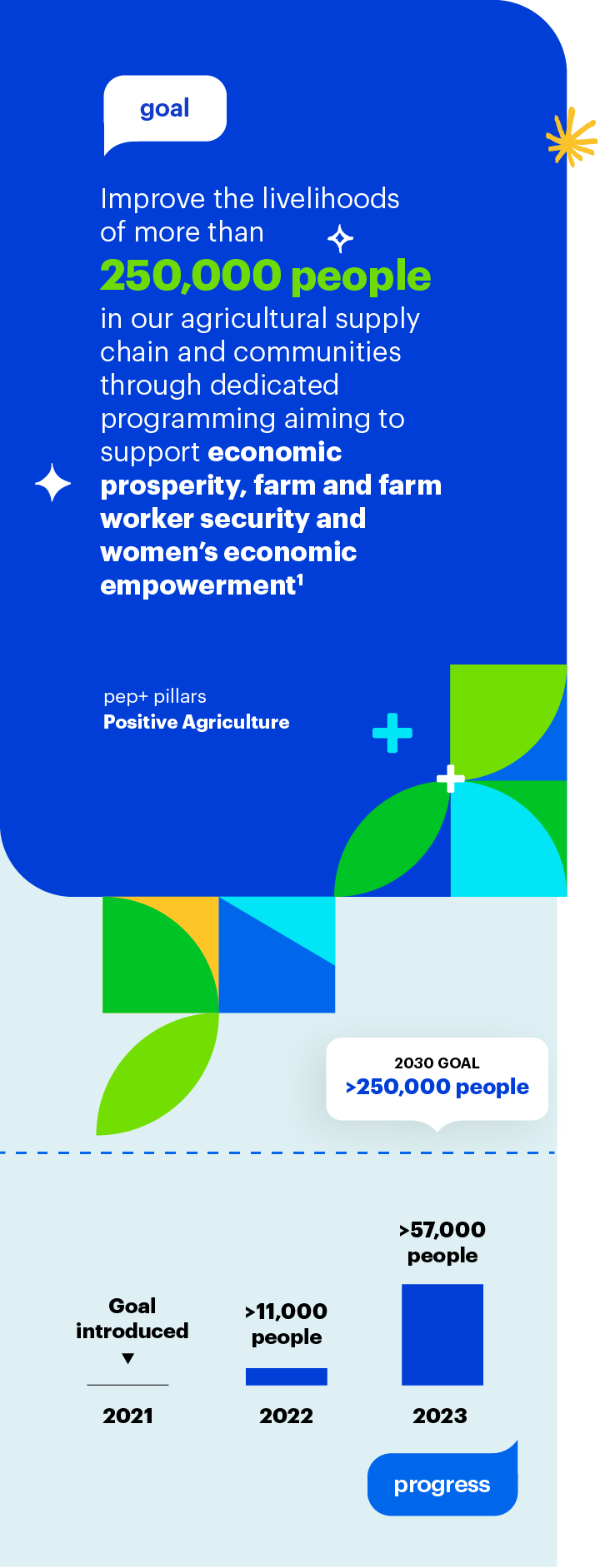
1. Metric counts the cumulative people impacted since 2021
Learn more about PepsiCo’s key agricultural strategic partnerships, how they are contributing to progress toward our 2025 and 2030 pep+ goals and the growing resilience and sustainability of our agricultural supply chain.
Explore agriculture topics in more depth
PepsiCo's ESG Topics A-Z provides detail on strategy, data, policy, progress and more on a wide range of subjects.
Positive Agriculture stories
PepsiCo announces agriculture accelerator projects to support farmer livelihoods, scale sustainable innovation and accelerate regenerative agriculture across the globe
Learn morePepsiCo and Walmart Aim to Support Regenerative Agriculture Across More than 2 Million Acres of Farmland
Learn moreOur 2023 ESG Performance Metrics
This download contains detailed performance data, tracking progress against our goals over the past three years.
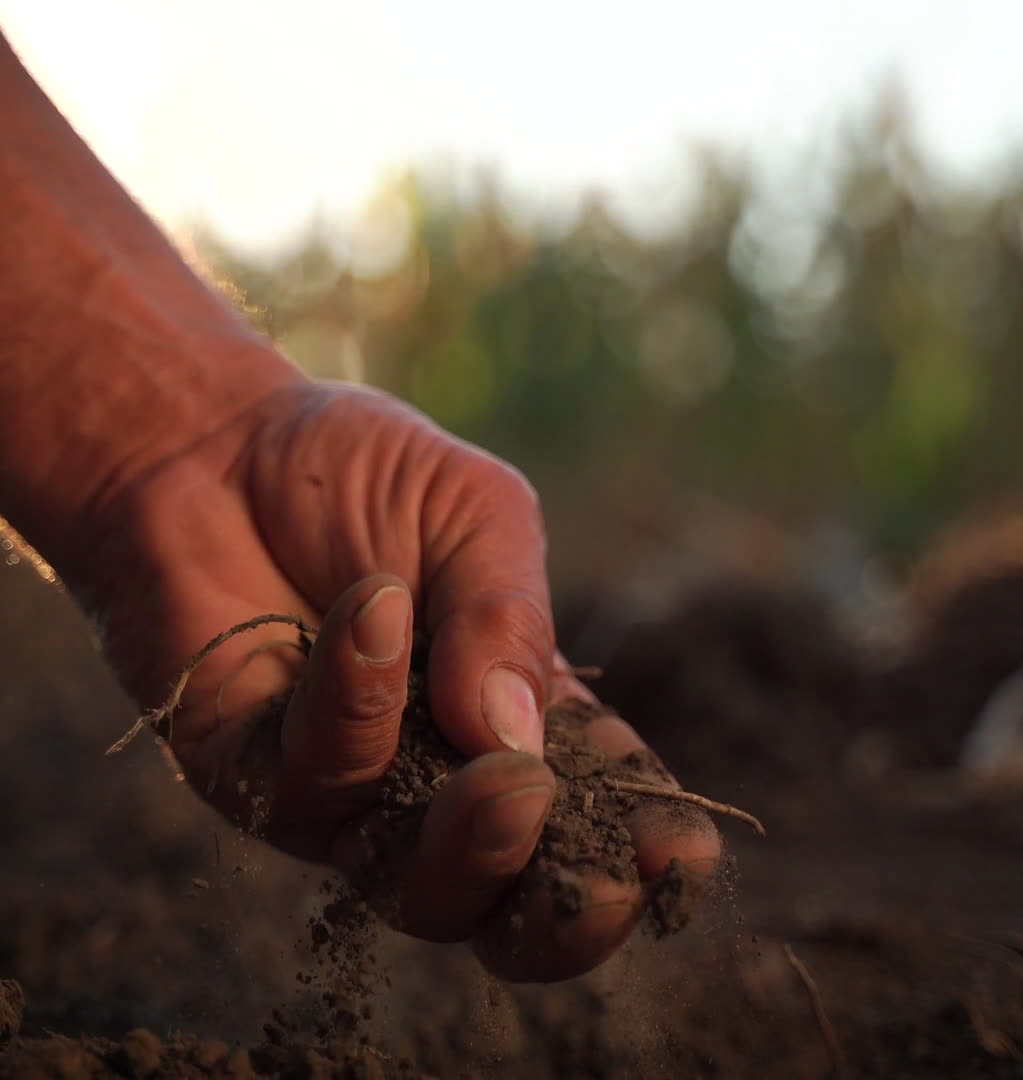
.png?sfvrsn=57ebd63d_0)
